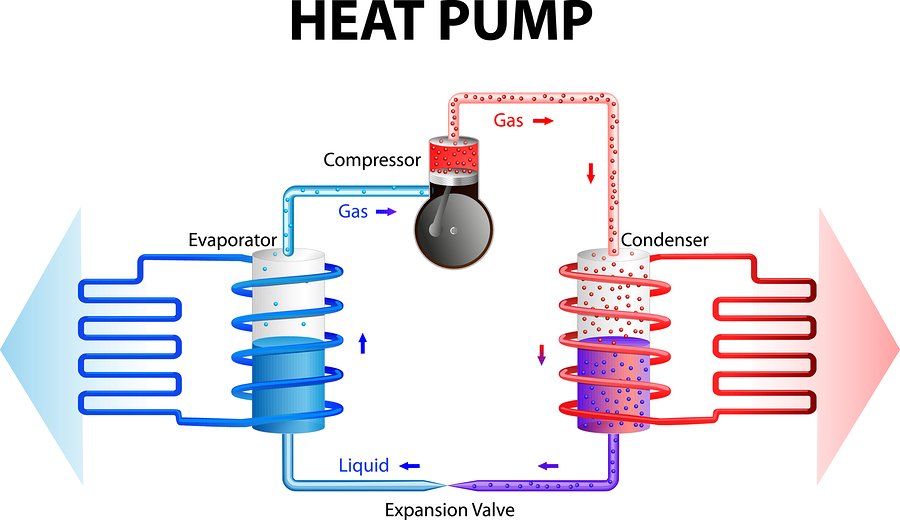Benefits of Heat Pump
Heat pumps are a highly efficient and eco-friendly heating and cooling solution that offers numerous benefits for residential and commercial spaces. In this article, we will explore the advantages of heat pumps and how they can surpass other heating and cooling systems in terms of energy efficiency, cost savings, and environmental impact.
Energy Efficiency
One of the key benefits of heat pumps is their exceptional energy efficiency. Unlike traditional heating systems that generate heat by burning fuel, heat pumps transfer heat from one place to another using a small amount of electricity. This process consumes less energy and results in significant cost savings on utility bills. Heat pumps can provide up to four times more energy than they consume, making them an environmentally friendly choice.
Cost Savings
Heat pumps can help you save a substantial amount of money on your heating and cooling expenses. By utilizing the heat transfer process, heat pumps can extract heat from the outdoor air, even in cold temperatures, and transfer it indoors. This eliminates the need for expensive and energy-consuming heating systems such as furnaces or boilers. Additionally, heat pumps can also be used for cooling purposes during the summer months, further reducing the need for separate air conditioning units.
Environmental Impact
With the increasing concern about climate change and environmental sustainability, heat pumps offer a greener alternative to traditional heating and cooling systems. By utilizing renewable energy sources such as the heat in the air or ground, heat pumps produce significantly fewer greenhouse gas emissions compared to fossil fuel-based systems. This not only helps combat climate change but also contributes to improving air quality and reducing our carbon footprint.
Year-Round Comfort
Heat pumps are designed to provide both heating and cooling, ensuring year-round comfort in your living or working space. During the colder months, heat pumps extract heat from the outside air or ground and transfer it indoors, effectively heating your home or office. In the warmer months, the process is reversed, and heat pumps extract heat from the indoor air and transfer it outside, providing efficient cooling. This versatility eliminates the need for separate heating and cooling systems, simplifying maintenance and reducing overall costs.
Quiet and Safe Operation
Heat pumps are known for their quiet and safe operation. Unlike traditional heating systems that involve combustion and can produce noise and potential safety hazards, heat pumps operate silently and do not pose the risk of gas leaks or carbon monoxide poisoning. This makes them an excellent choice for residential and commercial spaces where comfort, safety, and peace of mind are essential.
Long Lifespan and Low Maintenance
Heat pumps are built to last and require minimal maintenance. With proper installation and regular servicing, heat pumps can have a lifespan of up to 20 years or more. Additionally, heat pumps have fewer moving parts compared to traditional heating systems, reducing the risk of mechanical failures and the need for frequent repairs. This results in lower maintenance costs and increased reliability, making heat pumps a cost-effective long-term investment.

Heat pumps offer a range of benefits that make them an excellent choice for heating and cooling needs. From their exceptional energy efficiency and cost savings to their positive environmental impact and year-round comfort, heat pumps surpass other systems in various aspects. With their quiet and safe operation, long lifespan, and low maintenance requirements, heat pumps provide a reliable and sustainable solution for residential and commercial spaces. By choosing a heat pump, you can enjoy optimal comfort while reducing your carbon footprint and saving money on energy bills.
Frequently Asked Questions about the Benefits of Heat Pump
1. What is a heat pump?
A heat pump is a device that transfers heat from one location to another using electricity, providing both heating and cooling capabilities.
2. How does a heat pump work?
A heat pump works by extracting heat from the air, ground, or water source and transferring it into a space for heating purposes. It can also reverse the process to cool the space.
3. What are the main benefits of using a heat pump?
The main benefits of using a heat pump include energy efficiency, cost savings, versatility (providing both heating and cooling), and environmental friendliness.
4. Are heat pumps energy-efficient?
Yes, heat pumps are highly energy-efficient. They can produce up to three times more heat energy than the electrical energy they consume, resulting in significant energy savings.
5. How do heat pumps save on heating costs?
Heat pumps save on heating costs by extracting heat from the environment instead of generating it from scratch, making them more cost-effective than traditional heating systems.
6. Can a heat pump be used for cooling as well?
Yes, heat pumps can be used for cooling as well. They have a reversing valve that allows them to switch between heating and cooling modes, providing year-round comfort.
7. Are heat pumps environmentally friendly?
Yes, heat pumps are environmentally friendly. They do not burn fossil fuels or emit greenhouse gases, helping to reduce carbon emissions and combat climate change.
8. Are heat pumps suitable for all climates?
Heat pumps are suitable for most climates, although their efficiency may vary in extremely cold regions. However, advancements in technology have led to the development of heat pumps that can operate efficiently even in very low temperatures.
9. Do heat pumps require regular maintenance?
Yes, like any HVAC system, heat pumps require regular maintenance to ensure optimal performance. It is recommended to have a professional inspect and service your heat pump annually.
10. Are there any government incentives for installing a heat pump?
Yes, many governments offer incentives, tax credits, or rebates for installing energy-efficient heat pumps. Check with your local authorities or energy providers to see if you qualify for any incentives.




